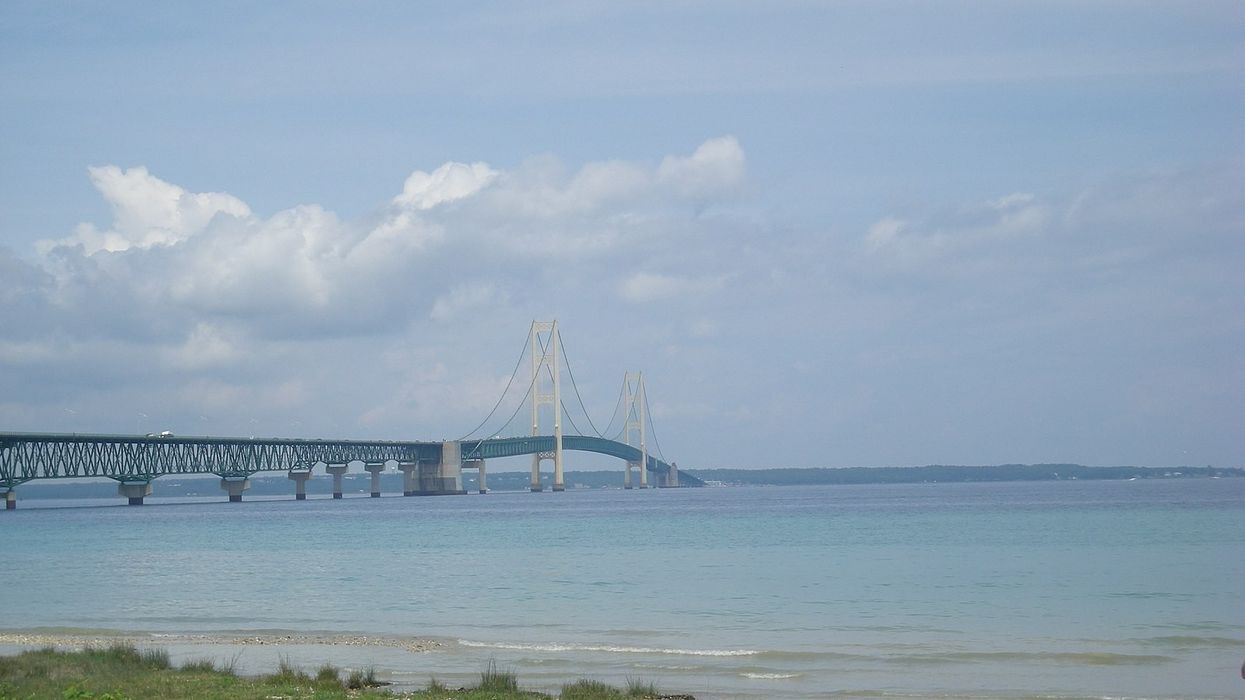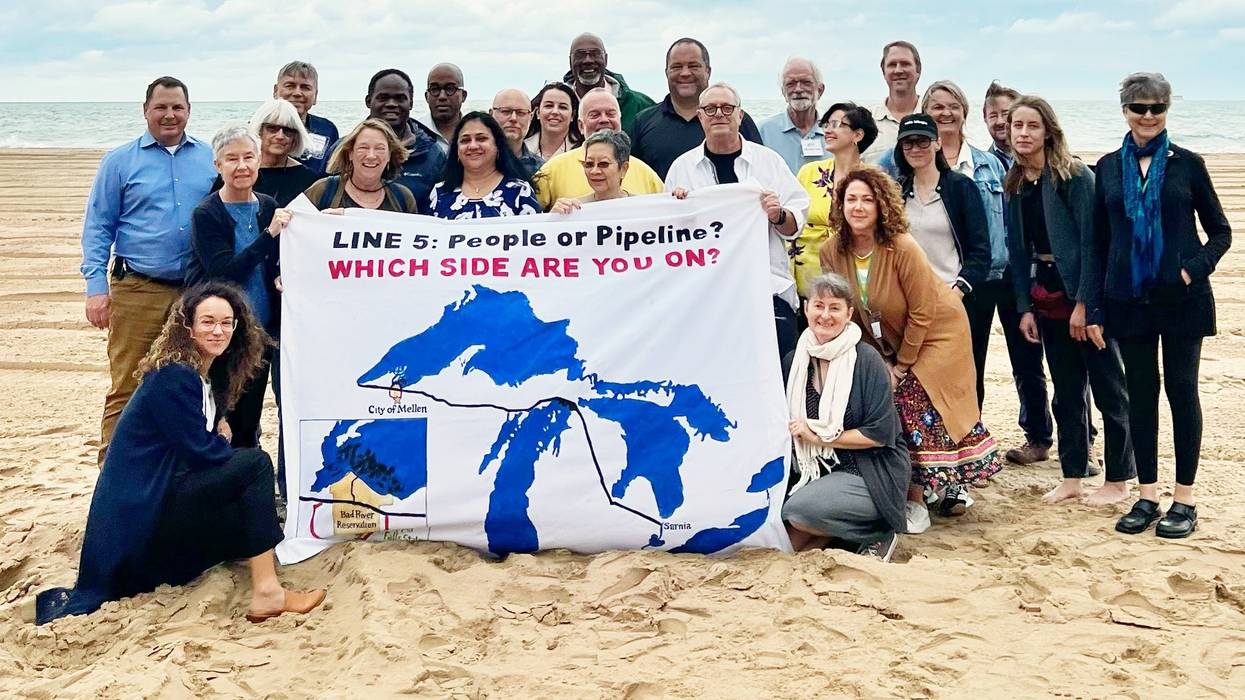Last month, two separate court decisions highlighted the repression being leveled on our Water Protector allies.
On March 19, a jury in Mandan, North Dakota, in Morton County, leveled a blistering $660 million verdict against Greenpeace for its part in the Standing Rock resistance against the Dakota Access Pipeline (DAPL). Anyone who was at Standing Rock knows that Greenpeace was barely there, but they have a name, and Energy Transfer, the pipeline’s owner, made an example out of them. I was in the courtroom when the verdict came in. It was sickening.
When Energy Transfer sues people for so-called defamation, they send a clear message: If you stand up, you will be punished in a lawsuit.
On March 10, Marian Moore, a Water Protector who had participated at a gathering to pray for healing, had her charges reversed by a Minnesota Court of Appeals. Her story: Marian, 67, a long-human rights advocate and environmentalist, was the daughter of Paul Moore Jr., the Episcopal bishop of New York from 1972 to 1989 who had walked with Martin Luther King Jr. during the civil rights movement. In this century, Marian had been active in opposing Enbridge’s Line 3 pipeline, which crosses northern Minnesota, on its way from Calgary, Alberta, to Superior, Wisconsin, on lands that are subject to Native treaty rights and through waters full of wild rice, an essential food to the Anishinaabe.
On January 9, 2021, Moore was among the more than 100 Water Protectors who gathered on state Highway 169 for a prayer ceremony near a Line 3 construction site in Aitkin County. For that, she caught three charges, including trespass on critical infrastructure (a gross misdemeanor), unlawful assembly and, rather redundantly, presence at an unlawful assembly (both misdemeanors). I was a witness in her defense.
In November, 2023, an Aitkin County jury found her guilty of gross misdemeanors and sentenced her to six months in county jail, but with a stay of execution for nine months, allowing her to appeal. “I had to not trespass on any Enbridge property and be law-abiding, or I would be in Aitkin County jail for six months,” she explains to me.
Six months seems like a long time for someone who stood on a state highway to pray, looked at a construction site, and left once a dispersal order was given. “I think they targeted me because I was friends with Indigenous people and [was] bringing money to the movement against the pipeline,” says Marian.
Meanwhile out in Morton County, Greenpeace is getting socked with that ridiculous verdict. $660 million is a lot of money for some folks who were barely at Standing Rock. Aitkin County, Minnesota, and Morton County, North Dakota, are trying to teach a lesson; or, more appropriately, through these cases, corporations are trying to stifle resistance and discourage allies.
How Does This happen?
Welcome to the New Order, the one where corporations are now considered legal “persons,” protected by law enforcement and the judicial system as they press the law’s boundaries and extract precious resources.
The entire trial against Greenpeace was shameful.
Here’s how it went: The law firm Gibson Dunn carefully picked Mandan in Morton County, an oil-friendly jurisdiction where Judge James Gion denied most important motions made by Greenpeace. Four motions to change the venue from Mandan were denied. Gion would not let Greenpeace tell the jury of Energy Transfer’s terrible safety record. According to a report by Greenpeace and Waterkeeper Alliance, the Pipeline Hazardous and Materials Safety Administration (PHMSA) issued 106 safety violations to Energy Transfer and Sunoco between 2002 and 2018, including failures to conduct corrosion inspections, to maintain pipeline integrity, and to repair unsafe pipelines in a timely manner within five years.
What’s so sad is that the North Dakota jury couldn’t even stand up for the water, the land, and the people.
Greenpeace was not allowed to tell the jury that Energy Transfer’s identical federal lawsuit against Greenpeace was dismissed by a federal judge. The judge effectively limited defense evidence.
Gion would not allow live streaming, so if you wanted to “see justice” you had to go to Mandan. It’s said that justice is blind, and, in North Dakota, justice is literally blind and asleep. I saw jurors asleep while on duty in the court room.
“Greenpeace did not manipulate Standing Rock, but Energy Transfer has manipulated Morton County,” Janet Alkire, chairwoman of the Standing Rock Sioux Tribe, said in a statement shortly after the verdict.
As I drove toward Bismark from my own reservation, White Earth, a verse from the Rolling Stones’ “You Can’t Always Get What You Want” stuck in my head: I went down to the County Courthouse to get my share of abuse. At least that’s how I sing it. I’ve had my share. That’s what it’s like being on trial in the Deep North, especially if you’re a Water Protector.
The chances for a Native person to get justice in North Dakota or northern Minnesota are probably pretty small. Native people represent a third of the people in jail in Becker, Hubbard, and Aitkin counties. Yet, we represent only 5.2% of the population.
Standing Rock Tribal Chairwoman Alkire was appalled at the state of justice in Mandan:
I take offense to the jury verdict… We expect more from North Dakota judges and members of the jury from our neighboring communities… Neither Greenpeace nor anyone else paid or persuaded Standing Rock to oppose DAPL… Energy Transfer’s false and self-serving narrative that Greenpeace manipulated Standing Rock into protesting DAPL is patronizing and disrespectful to our people. We understand that many Morton County residents support the oil industry… But we are your neighbors, and you should not be fooled that easily.
The lawsuit against Greenpeace is called a SLAPP suit, or Strategic Litigation against Public Participation. It is intended to silence opposition. There are anti-SLAPP laws in 35 states, including Minnesota. Fundamentally, this is a question of free speech. When Energy Transfer sues people for so-called defamation, they send a clear message: If you stand up, you will be punished in a lawsuit.
“To me, this is a freedom of speech case and freedom of association case,” attorney Sarah Vogel, a onetime assistant U.S. attorney and former North Dakota agriculture commissioner, told the North Dakota Monitor before the case went to trial. Vogel, who grew up in Mandan, said, “As residents of a small state without a whole lot of power, we’d better be able to speak up. Who knows? I mean, this time, it’s Greenpeace, but who will it be next time?”
The case in Aitkin County was a little different but had some of the same premises. The idea that “outside agitators” came and did not do nice things was a theme. Greenpeace fits that narrative for Energy Transfer, and Marian Moore, who is a striking six feet two inches tall, does not quite look like a local gal.
Trey Cox is Energy Transfer’s lead attorney from Gibson Dunn (the same law firm that brought us the Chevron Donziger verdict). Cox kept referring to Water Protectors as outsiders and paid protesters. One might wonder, where Energy Transfer is from? Certainly not from Mandan. They are from Texas. Where was TigerSwan, the private security company hired by Energy Transfer from? North Carolina. And where was Frost Kennels, the company whose employees unleashed dogs on Water Protectors, from? Ohio. In other words, mercenaries.
In Minnesota, remember that Enbridge is a foreign corporation from Canada, with big swaths of pipeline networks across our north country, including aging pipes and the dirtiest oil in the world that poses a major threat to the Great Lakes, repository of a fifth of the world’s freshwater. Yet, Enbridge received priority policy protection in Minnesota during the Covid-19 pandemic and was allowed to bring in 4,300 people to build Line 3 as a part of “essential industry” in the state.
These companies also want to censure and erase any mentions of their abysmal safety records. Energy Transfer has a multitude of fines for spills, and Enbridge has the two largest oil spills on the U.S. mainland to its name. In the North Dakota trial, Greenpeace could not bring up Energy Transfer’s safety record, while in Aitkin County, the judge did not allow Marian Moore to say “treaty rights” or allude to the Minnesota case where Anishinaabe Water Protectors’ charges were dismissed in September 2023, based on the treaty and cultural beliefs, and “in the interests of justice.”
The Pipeline to Curtail First Amendment Rights
The Trump administration intends to further criminalize Water Protectors, and certainly protests in general. That much is clear. This is on top of the more than 300 anti-protest bills introduced in state legislatures since 2017, according to the International Center for Not-for-Profit Law, 54 of which have been enacted and currently undermine the First Amendment right to freedom of speech and assembly.
Moreover, over the past half-century, a dangerous doctrine of “qualified immunity” has been hatched up, underwritten by the Supreme Court, to limit the ability of individuals to hold police officers accountable for violating their constitutional rights. Qualified immunity basically gives officers expanding impunity to injure, or even kill, civilians like Water Protectors.
In April 2024, North Dakota Federal Judge Daniel Traynor dismissed Sophia Wilansky’s case against North Dakota law enforcement on the grounds that law enforcement had “qualified immunity.”
Greenpeace was inspired by a story called the Rainbow Warrior, where people of all colors would come together to protect Mother Earth.
A blast from an “explosive munition” was leveled at her in the early hours of November 21, 2016. Law enforcement had constructed a barricade across Backwater Bridge on North Dakota Highway 1806 to prevent unarmed Water Protectors, including Wilansky, from using the road. Morton County Deputy Jonathon Moll, had positioned himself on the turret of a Humvee and fired a flashbang grenade from his 12-gauge shotgun, hitting Wilansky, nearly severing her hand and destroying almost all of the arteries, skin, tissue, muscles, nerves, tendons, and bone in her left forearm. “At 21-years-old, I lost the use of my arm because a police officer shot me from a gun turret with an exploding grenade at a protest. My life will never be the same, but I will also not be scared away from fighting for what is right,” Wilansky said in a Civil Liberties Defense Center media release on April 6, 2024. An additional statement read: “The doctrine of Qualified Immunity is repulsive in that it allows police officers to… shoot protestors with anything they want without repercussions.”
Yes, there will be appeals. Marian Moore won on appeal. And a Greenpeace spokesperson told Barn Raiser the nonprofit will appeal the verdict, but the timing and process of the appeal has yet to be determined.
But what’s so sad is that the North Dakota jury couldn’t even stand up for the water, the land, and the people. Instead, that jury gave a Texas oil pipeline company, founded by Trump-supporting billionaire Kelcy Warren, everything it wanted and then some. That was shameful. And, without that appeals court, an Aitkin County jury would have been content to let Marian Moore sit in the slammer.
Marty Garbus is a trial attorney who has represented, among others, Nelson Mandela, Leonard Peltier, Daniel Ellsberg, Lenny Bruce, Elie Wiesel, Cesar Chavez, and Vaclav Havel. Garbus is also a member of the Energy Transfer v. Greenpeace Trial Monitoring Committee, a group that followed the trial day in and day out. Here is what he said when the jury returned its shameful verdict:
In my six decades of legal practice, I have never witnessed a trial as unfair as the one against Greenpeace that just ended in the courts of North Dakota. This is one of the most important cases in American history. The law that can come down in this case can affect any demonstration, religious or political. It’s far bigger than the environmental movement. Yet the court in North Dakota abdicated its sacred duty to conduct a fair and public trial and instead let Energy Transfer run roughshod over the rule of law.
Greenpeace has very strong case on appeal. I believe there is a good chance it ultimately will win both in court and in the court of public opinion.
What to do? Stand our ground. Make the solutions. And keep working together.
In Minnesota, we call ourselves the Home Team, and we are many colors. Marion and thousands of others told their stories and faced a lot of police for the sake of protecting water. I, for one, am grateful to them, and the new work underway by groups like Rise and Repair in Minnesota that does multi-racial organizing work around climate justice.
Weweg bi azhe giiwewag. The snow geese return.
There is greatness in the flocks of birds returning to these lands of water. Each year, they return and remind us of the life that is here, a life which needs water. I am reminded that’s who I work for. Greenpeace was inspired by a story called the Rainbow Warrior, where people of all colors would come together to protect Mother Earth. Critics say the story wasn’t a real prophecy, but I see it happening today. People of all colors coming together to protect Mother Earth is a good story for epic times. Thank you, allies.




